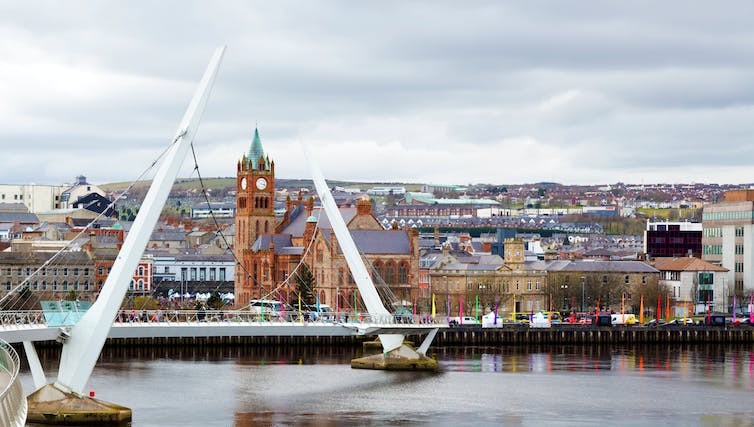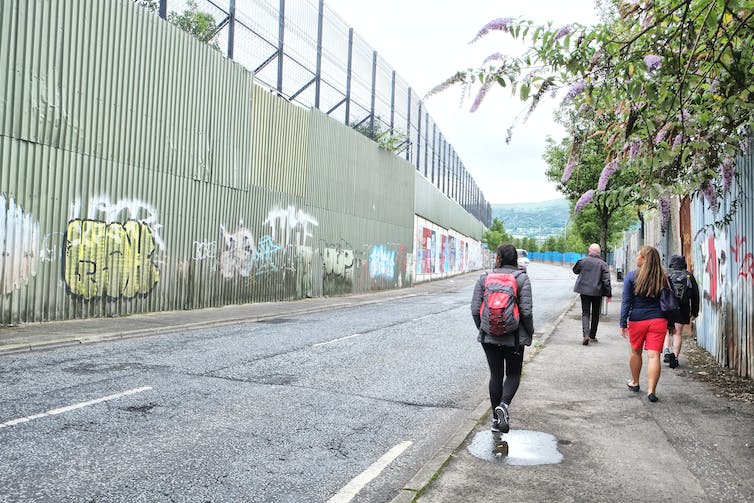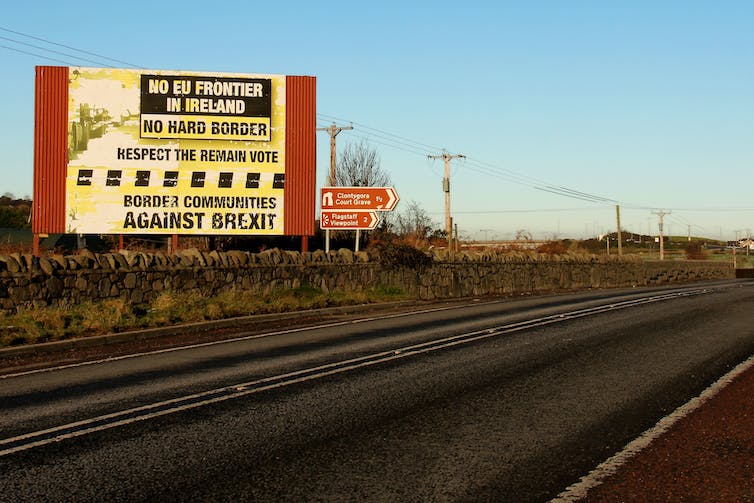Belfast City Hall, Northern Ireland. Ballygally View Images | Shutterstock
The outcomes of the 2021 Northern Ireland census have been launched and so they present that 42.3% of the inhabitants determine as Catholic and 37.3% as Protestant or different Christian. The census included a supplementary query asking respondents – whether or not they have been in actual fact spiritual or not – during which faith they have been introduced up. When including in these solutions, the chances of Catholics and Protestants rise to 45.7% and 43.5% respectively.
You can take heed to extra articles from The Conversation, narrated by Noa, right here.
This end result, although not surprising, is massively symbolic. When Ireland was partitioned a century in the past, faith figures from the 1911 census have been used to attract Northern Ireland’s boundaries. This was to make sure that the territory had a Protestant majority of roughly two-to-one, supportive of the union with Britain.
As with earlier Northern Ireland censuses, the highlight has been on the faith numbers. Headlines throughout the board have highlighted that Catholics now outnumber Protestants for the primary time. Drawing political conclusions from these figures, nonetheless, has all the time been problematic.

The Peace Bridge over the river Foyle, in Derry, inaugurated by each Northern Irish and Irish leaders in 2011.
Emerald Vision | Shutterstock
What the faith statistics really present
It is no surprise that these most up-to-date census outcomes have been hailed by nationalists as signalling that Irish reunification is edging nearer. The Good Friday Agreement features a provision for a border ballot to be held, ought to a majority seem to favour Irish unity. With Brexit already inflicting some to query the worth of Northern Ireland’s place within the union, some have instructed that demographic change is likely to be a consider triggering a ballot.
Opinion polling, nonetheless, has constantly proven {that a} vital minority of Catholics don’t essentially favour Irish reunification. Further, the proportion of the inhabitants describing themselves as neither Protestant nor Catholic has been rising. In 1991, solely 3.7% stated said that that they had no faith. This has now grown to 17.4%.
It was exactly because of this that in 2001, confronted with the necessity for knowledge for the aim of equalities monitoring, that statisticians added the brand new query about spiritual background.
What we see now’s an growing proportion of individuals answering “none” in response to this supplementary query as effectively –- as much as 9.3% in 2021, from 5.6% in 2011. This is, partly, why it seems more and more unsure whether or not the recorded Catholic share of the inhabitants will finally develop to exceed 50%, which some commentators beforehand anticipated as a border ballot set off.
While these describing themselves as Catholic or from a Catholic background now outnumber these from Protestant backgrounds, between 2011 and 2021, their share of the inhabitants solely grew from 45.1% to 45.7%. In the medium time period at the least, Northern Ireland seems set to have three communities, none of which represent a majority: Catholics, Protestants and “neithers” or “others”.

A rising proportion of the Northern Irish inhabitants identifies as neither Catholic or Protestant.
Dignity100 | Shutterstock
How folks outline their nationwide id
Given all this, some will search for potential clues to the constitutional future elsewhere within the outcomes. Since 2011, the census has included questions on each passports held and nationwide id, as an illustration.
It is tempting to assume that these questions have been added due to their relevance to the controversy about Northern Ireland’s future. The actual causes although are extra mundane. Moreover, they’re requested in all components of the UK.
The query on passports was added, initially to the censuses of England and Wales and of Northern Ireland, with a purpose to assist fulfill an EU requirement for knowledge on citizenship whereas the UK was nonetheless a member state. The responses obtainable are “United Kingdom”, “Ireland”, “different” and “none”. Perhaps mockingly, the rise within the variety of folks saying they maintain Irish passports – from 375,800 in 2011 to 614,300 in 2021 – is more likely to have been pushed as a lot by Brexit as by shifting demography.

Rising numbers of Northern Irish residents holding Irish passports is due, partly, to Brexit-related border woes.
Jonny McCullagh | Shutterstock
The addition of the nationwide id query, in the meantime, was prompted by criticism of the way in which the census had beforehand framed ethnicity. The 2021 census gave folks in Northern Ireland a number of nationwide id choices, together with British, Irish and Northern Irish. And not like with faith, they have been in a position to tick multiple field.
In 2011, the outcomes of this new query appeared to supply some hope to supporters of the union. While the Protestant majority had disappeared, unionists have been in a position to level to the truth that solely 25% of individuals described themselves solely as Irish. While these figuring out as British didn’t represent a majority, they have been nonetheless the most important group.
Come 2021, nonetheless, and the proportion describing their nationwide id as British (alone or together with different identities) has dropped from 48.4% to 42.8%. As the Belfast Telegraph’s Sam McBride has put it, this “makes unspinnably grim studying for unionists”.
Just as with the faith statistics although, there’s a third vital group that emerges from the nationwide id responses. Adding additional complexity to the image, 31.5% of respondents recognized as Northern Irish, with 19.8% deciding on this as their solely nationwide id, highlighting that nationwide id might be extra complicated than citizenship.
When a border ballot comes, the result will likely be determined within the poll field reasonably than on census kinds. This is to not deny that demographic change is going on in Northern Ireland or that it’s politically vital.
What the census outcomes spotlight shouldn’t be merely that there are actually extra Catholics than Protestants, however that there’s a rising section of the inhabitants that defies categorisation. Given that Northern Ireland now not has a majority group and may not achieve a brand new one anytime quickly, interesting to this rising center goes to be a giant a part of how the constitutional future will likely be gained.
![]()
Laurence Cooley receives funding from the Economic and Social Research Council.
